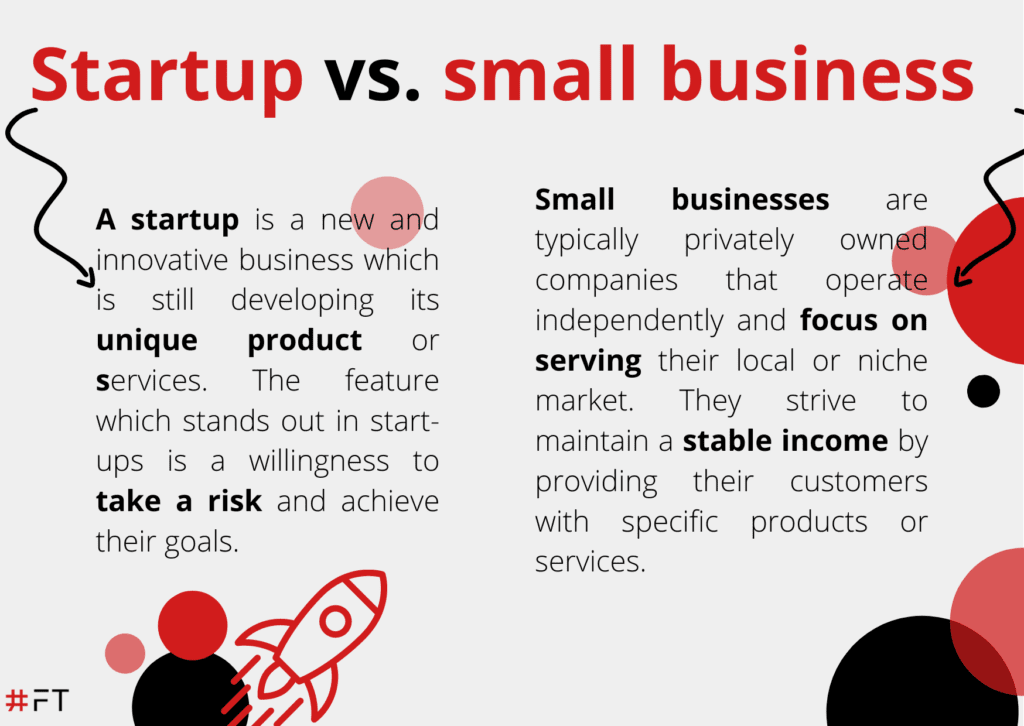Today, in this article, we want to explain the difference between a startup vs. small business. For those who don’t know the difference keep reading and expand your knowledge, and for those who know, you can check if you have still good information!
Nowadays, startups have become more and more popular. Everyone knows Uber, Snapchat and Airbnb. All these companies had begun as a startup, and now they are big, well-worked companies. Despite startup popularity, they are still one big unknown for a big part of society. The word startup is often changed to small businesses, which is incorrect because these two are two, completely different.

What a startup is?
A startup is a new and innovative business which is still developing its unique product or services. The feature which stands out in start-ups is a willingness to take a risk and achieve their goals. Startups may have a longer runway to profitability than more established businesses, as they are focused on developing their product or service and growing their customer base. Successful startups often become major players in their respective industries and can have a significant impact on the economy and society as a whole.
People when they hear about startups often think about America and Silicon Valley. Of course, that’s true. Many popular firms began as a start-up in that area. But to be honest, the CEO of a startup can be everyone. The only necessary thing to start a startup is an innovative idea.
Small business vs. startup – definition
Small business is exactly what the name suggests. It can be privately held companies, partnerships or sole proprietorships. The adjective small is connected with the amount of revenue brought and the number of employees. The most important feature of this kind of business is that tier does not try to dominate the market like a startup. Small businesses are typically privately owned companies that operate independently and focus on serving their local or niche market. They strive to maintain a stable income by providing their customers with specific products or services. Unlike startups, small businesses have less risk of failure and are often sustainable in the long run. These businesses are crucial to local economies and provide meaningful employment opportunities for their owners and employees.
Startup vs. small business
As you know, startups and small businesses are not the same. Here are the most common differences between these two:
Stage of development and growth potential
Startups, as opposed to small businesses, are more focused on developing a unique product or service that has the potential to scale rapidly. In contrast, small businesses have been established for a longer period of time and have a more established business model. They are often focused on serving a specific market niche and maintaining a stable customer base.
Level of risk
Startups are often high-risk ventures that require significant investments of time and money, with no guarantee of success. In contrast, small businesses typically have a more predictable revenue stream and a proven business model. They are often viewed as less risky investments by lenders and investors.
Technologies
In small businesses, there is no need for any special technologies. There are plenty, of ready and well-worked technological solutions, which can be used by small companies. In startups, the situation looks a little bit different. But even if it is not so, the startup can not help but use technologies which help them achieve faster growth and scale-up.
Lifecycle
The risk of failure is much higher in the case of a startup than in a small business.
Team and management
A small business typically hires workers as needed in order to operate within its growth limitations. Therefore, it is important for startup managers to develop leadership and management qualities from the outset to ensure rapid growth. As the company expands, the manager will need to work with an increasing number of staff, investors, directors, and other stakeholders.
In conclusion, understanding the difference between a startup vs. small business is essential for entrepreneurs and investors alike. While both types of businesses play an important role in the economy, they have different goals, risks, and strategies. Startups are focused on developing innovative products or services that can scale rapidly, while small businesses aim to serve a specific niche or local market. The level of risk and investment needed for startups is typically higher, while small businesses have a more predictable revenue stream and established business model. Regardless of which path an entrepreneur chooses, it is crucial to have a clear understanding of the differences and to develop a solid business plan to achieve success.
If you have any questions about how startups work, write to us! We are open to all questions! If you are interested in the startup topic, check out our blog, or Instagram where we write more about it.
